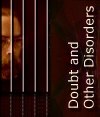Doubt and Other Disorders Homepage
Doubt is thought's despair; despair is personality's doubt. . .;
Doubt and despair . . . belong to completely different spheres; different sides of the soul are set in motion. . .
Despair is an expression of the total personality, doubt only of thought. -
Søren Kierkegaard
|
For myself and those millions of others who live with the "Doubting Disease", as Obsessive-Compulsive Disorder (OCD) is sometimes called the answer is, yes. For us doubt can be pathological.
There is a need for certainty in OCD. Certainty is, of course, elusive. It is in this not knowing that compulsive ritual is born.
The disorder asks, "What if?". The question comes unbidden. In answering that question we are lost. We are lost in a labyrinth of increasing anxiety unable to break free. Fear, horrific images, vivid terrifying consequences consume us. "What if?" is the obsession.
If only we could know for sure that these terrors will not come to pass. But we can not know. There is something fundamentally wrong with that process in us. The disorder is unable to tolerate uncertainty. In the absence of certainty we seek relief. We seek anything that will stop this searing anxiety. One whose fears are centered around contamination will begin to wash or decontaminate. Another will check to make sure they have done something or not done something and on it goes. Soon the behavior becomes ritualized. It has to be done a certain way and a certain number of times. It evolves becoming more and more complicated until it takes over the persons life.
OCD afflicts 2%-3% of any given population . It does not discriminate, geographically or ethnically. It is found across the whole spectrum of human culture and population. Many of these millions of sufferers do not know what is wrong with them. They do know that something is wrong. They know that these strange demands are irrational but cannot stop. They do not know that they are not alone.
This page is just by one of those people.
If this page helps anyone, either to find help or just to discover they are not alone, then it's purpose will have been then defined. I am just attempting to carry the message.
I am not a doctor, therapist or professional in the treatment of CD. This site reflects my experience and my opinions only, unless otherwise stated. I am not responsible for the content of links I may point to or any content or advertising in HealthyPlace.com other then my own.
Always consult a trained mental health professional before making any decision regarding treatment choice or changes in your treatment. Never discontinue treatment or medication without first consulting your physician, clinician or therapist.
Content of Doubt and Other Disorders
copyright ©1996-2009 All Rights Reserved
next: About Me
~ ocd library articles
~ all ocd related disorders articles
APA Reference
Gluck, S.
(2009, January 9). Doubt and Other Disorders Homepage, HealthyPlace. Retrieved
on 2026, March 5 from https://www.healthyplace.com/ocd-related-disorders/articles/doubt-ocd-doubting-disease


